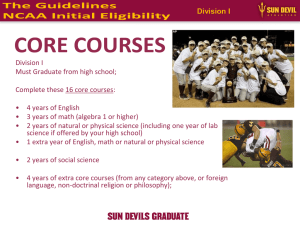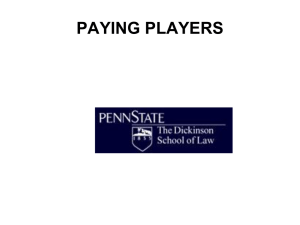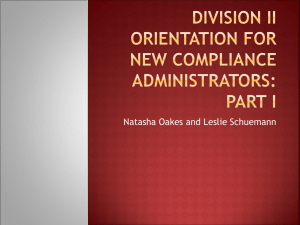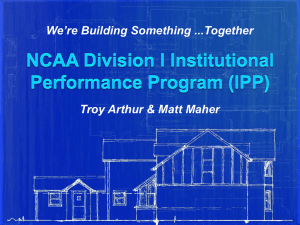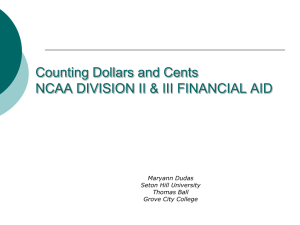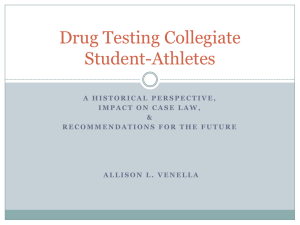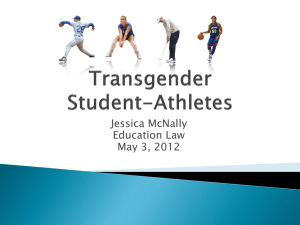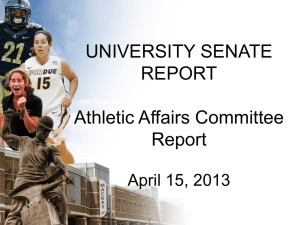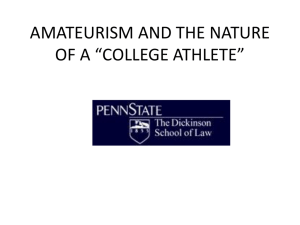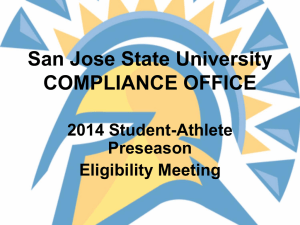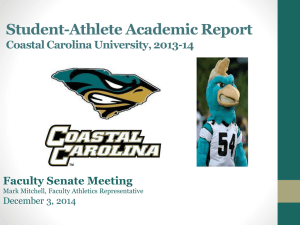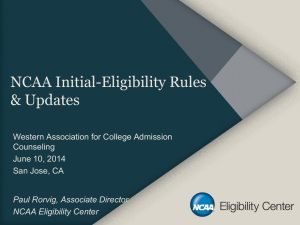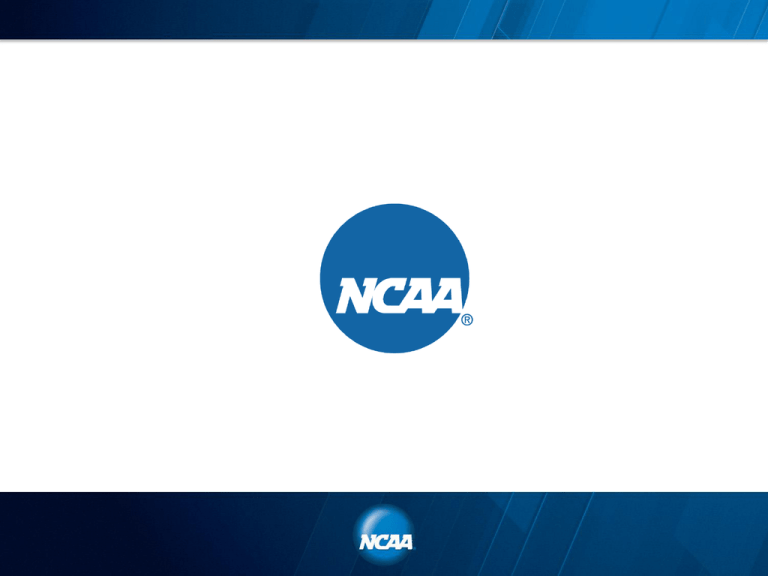
OFFICE OF INCLUSION
Philosophical Framework
• As a core value, the NCAA believes in and is committed to
diversity, inclusion and gender equity among its studentathletes, coaches and administrators.
• We seek to establish and maintain an inclusive culture
that fosters equitable participation for student-athletes
and career opportunities for coaches and administrators
from diverse backgrounds.
• Diversity and inclusion improve the learning environment
for all student-athletes and enhance excellence within
the Association.
Philosophical Framework (cont.)
“The NCAA will provide or enable programming and
education, which sustains foundations of a diverse and
inclusive culture across dimensions of diversity
including, but not limited to: age, race, sex, class, creed,
educational background, disability, gender expression,
geographical location, income, marital status, parental
status, sexual orientation and work experiences.”
Philosophical Framework (cont.)
Programming and education also will strive to support
equitable laws and practices, increase opportunities for
individuals from historically underrepresented groups to
participate in intercollegiate athletics at all levels, and
enhance hiring practices for all athletics personnel to
facilitate more inclusive leadership in intercollegiate
athletics.
Adopted by the
NCAA Executive Committee
April 29, 2010
Changing the Discourse:
A Philosophical Shift
•
Diversity as a metric.
•
Inclusion is valued in leadership and decision-making process.
•
Shift in primary focus from development and delivery of programmatic
elements to advocacy for best practices and policy development.
•
Elevated the importance of this initiative.
•
Reorganization of governance structure.
Inclusion Summit Theme
Challenges, Champions and
Collaborative Strategies:
Moving Toward a More Inclusive Culture
Challenges
•
•
•
•
•
LGBT.
Women.
Racial Ethnic Minorities.
Student-Athletes with Disabilities.
International Student-Athletes.
Champions
• Presidential panel.
• Best practices.
• Presidential engagement.
Collaborative Strategies
• Presidential leadership and
engagement.
• Student-athlete experience.
• Role of the NCAA national office.
Video Presentation
Inclusion Strategic Initiatives
Women in
Intercollegiate
Athletics
Strategic Initiative
• Raise awareness on the status of women
in athletics and Title IX requirements.
• Targeted Population: All NCAA members,
campus authorities, the media and the
public.
• Timeline: Summer 2012.
Strategic Initiative
• Enhanced learning and professional environment
for women with increased emphasis on minority
women.
• Targeted Population: All staff and coaches on
campus and at conferences through their
respective leadership.
• Timeline: Winter 2012.
Lesbian, Gay, Bisexual and Transgender (LGBT) Communities in
Intercollegiate Athletics
Strategic Initiative
• Address the educational environment for LGBT
student-athletes to ensure fairness and access.
• Targeted Population: LGBT student-athletes in
partnership with governance groups, such as
SAAC and NCAA Sportsmanship Committee.
• Timeline: Fall 2012.
Strategic Initiative
• Address athletics environment to improve the
professional experience of LGBT coaches and
administrators.
• Targeted Population: NCAA coaches,
administrators and staff.
• Timeline: 2013 and 2014.
Racial and Ethnic Minorities in Intercollegiate Athletics
Strategic Initiative
• Develop an NCAA-sponsored
search firm summit.
• Targeted Population: Search firms,
advocacy groups and
presidents/chancellors.
• Timeline: Summer/fall 2012.
Strategic Initiative
• Development of best practices resource.
• Targeted Population: NCAA membership and
advocacy groups.
• Timeline: Fall 2012.
International Student-Athletes in
Intercollegiate Athletics
Strategic Initiative
• Enhance understanding of issues faced by
international student-athletes.
• Targeted Population: General studentathlete population/international studentathletes/athletics administrators/coaches.
• Timeline: Fall 2012.
Strategic Initiative
• Develop resources and programming
related to retention and climate.
• Targeted Population: General
student-athlete population/coaches/
administrators.
• Timeline: Spring 2013.
Student-Athletes with Disabilities in
Intercollegiate Athletics
Strategic Initiative
• Share best practices pertaining to
support of student-athletes with
disabilities.
• Targeted Population: Campus
administrators.
• Timeline: 2012-2013.
Strategic Initiative
• Raise awareness on the status of studentathletes with disabilities.
• Targeted Population:
Presidents/chancellors, diversity and
inclusion offices, athletics administrators,
coaches, student-athletes, and faculty
athletics representatives.
• Timeline: Fall 2012.
Initiatives to Consider
• Take messages back to campus to
challenge the process and continue the
discourse.
• Conference diversity/inclusion
committees.
• Support for the use of search firms.
CHANGE…
"The key to change... is to
let go of fear."
- Rosanne Cash
QUESTIONS ??
STUDENT-ATHLETE AFFAIRS
Session Overview
• Review session objectives.
• Explore the needs assessment.
• Discuss available resources.
• Examine existing scholarships and grants.
• Engage in dialogue about best practices.
Session Objectives
• Name programs and resources for the well-being and
development of student-athletes.
• Explain what resources provide coaches and
administrators with ongoing education and training.
• Describe best practices used to anticipate and deliver
effective services for student-athletes.
STUDENT-ATHLETES
Needs Assessment
• Online survey tool available to NCAA institutions.
• Administer to student-athletes to determine
programming needs.
• A follow-up report provides a rank ordering of 11 topic
areas.
Needs Assessment
1.
Study Skills and Time Management.
2.
Orientation and Advising.
3.
Nutrition and Eating Disorders.
4.
Risk Taking Behaviors/Safety.
5.
Self-Esteem.
6.
Mental Health.
7.
Communication, Support and Authority.
8.
Diversity, Inclusion and Gender Equity.
9.
Finances.
10.
Technology.
11.
Life after Sport.
Needs Assessment
Please indicate the extent to which you agree or disagree with
the following statements:
Mean
For the most part, I have time each day to accomplish the tasks that
I have planned.
3.82
I have been taught nutrition principles that assist me in performing at 3.56
my peak.
I would step in if someone I didn’t know well was engaging in risky
behavior and I felt they were in danger.
3.75
Inappropriate comments about someone’s race, gender, sexual
orientation or some other aspect of a person’s identity are not
common at my school.
3.39
I have received adequate instruction about managing my finances.
3.77
NCAA Resources
Campus & Conference Services
• Programming Topics:
• Branding.
• Conflict Resolution.
• DiSC.
• Emotional Intelligence.
• Facilitation.
• Goal Setting & Action Planning.
NCAA Resources
Campus & Conference Services
• Programming Topics:
• Leadership.
• 5 Practices of Exemplary Leaders.
• SAAC.
• Service.
• STEP UP! Program.
• Values.
NCAA Resources
Student-Athlete Affairs Grant:
•
Awards up to $2,000 to institutions or conferences.
•
Funds student-athlete development & health and safety
programming.
•
Speakers can be found on the NCAA Student-Athlete Affairs
Speakers Registry.
•
Grants are allocated by division.
•
55 for Division I
•
50 for Division II
•
70 for Division III
NCAA Resources
CHOICES Grant Program:
•
Funding (up to $30,000 over three years) to 15 NCAA member
institutions and conferences annually.
•
CHOICES projects must partner athletics with other campus
partners.
Development and implementation of effective alcoholeducation projects.
NCAA Resources
The APPLE Conference
•
Promotes student athlete health and wellness.
•
Empowers teams to create institution-specific action plans.
•
Action plans address student-athlete wellness and substance abuse
prevention.
Teams of four to six student-athletes and an administrator.
$300 registration fee per institution.
NCAA Resources
Student-Athlete Leadership Forum
•
Enhance personal awareness and leadership skills needed to
impact student-athlete development.
November 1-4, 2012, Dallas, Texas
Region 4: CA, CO, MN, NE, OR, TX, WA, WI
Two student-athletes per institution.
National Career in Sports Forum
•
Learn about and explore careers in sports, sports law and sports
entertainment.
June 7-10, 2012, Indianapolis, Indiana.
NCAA Scholarships
Postgraduate Scholarship
• $7,500 scholarships.
• Each sports season (fall, winter, and spring) .
• Minimum 3.2 GPA, athletic distinction, outstanding citizens and role
models.
Ethnic Minority & Women’s Enhancement Scholarship
• Increases the pool of and opportunities for qualified minority and
female candidates in intercollegiate athletics.
• $6,000 scholarship.
• NCAA Career in Sports Forum.
NCAA Scholarships
Walter Byers Scholarship
•
•
•
•
Awarded annually to one male and female student-athlete.
$24,000 scholarship for two years.
Minimum 3.5 cumulative GPA.
Superior character and leadership.
Jim McKay Scholarship
• $10,000 awarded annually to one male and female student-athlete.
• Minimum 3.5 cumulative GPA.
• Potential to make a major contribution in the sports communications
industry.
COACHES & ATHLETIC
PROFESSIONALS
NCAA Resources
Leadership Institute
•
Explores entire collegiate athletics community.
•
Assists ethnic minority males and females in strategically mapping
their careers.
Pathway Program:
•
Gain better understanding of role of athletic directors.
•
Provides in-depth look at NCAA governance structure.
•
Exposure to key stakeholders.
NCAA Resources
Education & Training Symposia:
•
Provides relevant, effective and practical training.
•
Development opportunities to enhance ability of professionals that
serve student-athletes.
Divisional Grants:
•
Division II Coaching Enhancement Grant Program.
•
Division II Strategic Matching Grant Program.
•
Division III Ethnic Minority and Women’s Internship Grant Program.
•
Division III Strategic Alliance Matching Grant Program.
NCAA Resources
Achieving Coaching Excellence Program
• Prepares racial and ethnic minority basketball coaches for success
as future head coaches.
• Training and education in the areas of:
• Leadership, communication, campus relations, media, community
involvement and program management.
NCAA Champions Forum
• Individuals identified as potential head coaches simulate the
interview process.
NCAA Resources
NCAA and NFL Coaches Academy
• Learn about and explore the progression of football coaching
careers and matriculation.
• Gain insight into what it takes to be an effective coach.
Future Football Coaches Academy
• Education on the various aspects of securing, managing and
excelling in current and future positions.
• Targets individuals who have recently completed college eligibility.
http://www.ncaa.org/studentathleteaffairs

